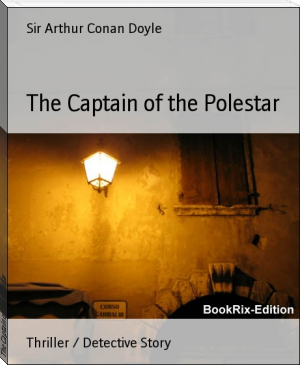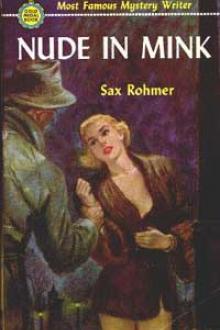The Captain of the Polestar by Sir Arthur Conan Doyle (i can read with my eyes shut .txt) 📖

- Author: Sir Arthur Conan Doyle
Book online «The Captain of the Polestar by Sir Arthur Conan Doyle (i can read with my eyes shut .txt) 📖». Author Sir Arthur Conan Doyle
I went round with my friend a few days afterwards to call upon Miss Northcott. I remember that, as we went down Abercrombie Place, our attention was attracted by the shrill yelping of a dog--which noise proved eventually to come from the house to which we were bound. We were shown upstairs, where I was introduced to old Mrs. Merton, Miss Northcott's aunt, and to the young lady herself. She looked as beautiful as ever, and I could not wonder at my friend's infatuation. Her face was a little more flushed than usual, and she held in her hand a heavy dog-whip, with which she had been chastising a small Scotch terrier, whose cries we had heard in the street. The poor brute was cringing up against the wall, whining piteously, and evidently completely cowed.
"So Kate," said my friend, after we had taken our seats, "you have been falling out with Carlo again."
"Only a very little quarrel this time," she said, smiling charmingly. "He is a dear, good old fellow, but he needs correction now and then." Then, turning to me, "We all do that, Mr. Armitage, don't we? What a capital thing if, instead of receiving a collective punishment at the end of our lives, we were to have one at once, as the dogs do, when we did anything wicked. It would make us more careful, wouldn't it?"
I acknowledged that it would.
"Supposing that every time a man misbehaved himself a gigantic hand were to seize him, and he were lashed with a whip until he fainted"--she clenched her white fingers as she spoke, and cut out viciously with the dog-whip--"it would do more to keep him good than any number of high-minded theories of morality."
"Why, Kate," said my friend, "you are quite savage to-day."
"No, Jack," she laughed. "I'm only propounding a theory for Mr. Armitage's consideration."
The two began to chat together about some Aberdeenshire reminiscence, and I had time to observe Mrs. Merton, who had remained silent during our short conversation. She was a very strange-looking old lady. What attracted attention most in her appearance was the utter want of colour which she exhibited. Her hair was snow-white, and her face extremely pale. Her lips were bloodless, and even her eyes were of such a light tinge of blue that they hardly relieved the general pallor. Her dress was a grey silk, which harmonised with her general appearance. She had a peculiar expression of countenance, which I was unable at the moment to refer to its proper cause.
She was working at some old-fashioned piece of ornamental needlework, and as she moved her arms her dress gave forth a dry, melancholy rustling, like the sound of leaves in the autumn. There was something mournful and depressing in the sight of her. I moved my chair a little nearer, and asked her how she liked Edinburgh, and whether she had been there long.
When I spoke to her she started and looked up at me with a scared look on her face. Then I saw in a moment what the expression was which I had observed there. It was one of fear--intense and overpowering fear. It was so marked that I could have staked my life on the woman before me having at some period of her life been subjected to some terrible experience or dreadful misfortune.
"Oh, yes, I like it," she said, in a soft, timid voice; "and we have been here long--that is, not very long. We move about a great deal." She spoke with hesitation, as if afraid of committing herself.
"You are a native of Scotland, I presume?" I said.
"No--that is, not entirely. We are not natives of any place. We are cosmopolitan, you know." She glanced round in the direction of Miss Northcott as she spoke, but the two were still chatting together near the window. Then she suddenly bent forward to me, with a look of intense earnestness upon her face, and said--
"Don't talk to me any more, please. She does not like it, and I shall suffer for it afterwards. Please, don't do it."
I was about to ask her the reason for this strange request, but when she saw I was going to address her, she rose and walked slowly out of the room. As she did so I perceived that the lovers had ceased to talk and that Miss Northcott was looking at me with her keen, grey eyes.
"You must excuse my aunt, Mr. Armitage," she said; "she is odd, and easily fatigued. Come over and look at my album."
We spent some time examining the portraits. Miss Northcott's father and mother were apparently ordinary mortals enough, and I could not detect in either of them any traces of the character which showed itself in their daughter's face. There was one old daguerreotype, however, which arrested my attention. It represented a man of about the age of forty, and strikingly handsome. He was clean shaven, and extraordinary power was expressed upon his prominent lower jaw and firm, straight mouth. His eyes were somewhat deeply set in his head, however, and there was a snake-like flattening at the upper part of his forehead, which detracted from his appearance. I almost involuntarily, when I saw the head, pointed to it, and exclaimed--
"There is your prototype in your family, Miss Northcott."
"Do you think so?" she said. "I am afraid you are paying me a very bad compliment. Uncle Anthony was always considered the black sheep of the family."
"Indeed," I answered; "my remark was an unfortunate one, then."
"Oh, don't mind that," she said; "I always thought myself that he was worth all of them put together. He was an officer in the Forty-first Regiment, and he was killed in action during the Persian War--so he died nobly, at any rate."
"That's the sort of death I should like to die," said Cowles, his dark eyes flashing, as they would when he was excited; "I often wish I had taken to my father's profession instead of this vile pill-compounding drudgery."
"Come, Jack, you are not going to die any sort of death yet," she said, tenderly taking his hand in hers.
I could not understand the woman. There was such an extraordinary mixture of masculine decision and womanly tenderness about her, with the consciousness of something all her own in the background, that she fairly puzzled me. I hardly knew, therefore, how to answer Cowles when, as we walked down the street together, he asked the comprehensive question--
"Well, what do you think of her?"
"I think she is wonderfully beautiful," I answered guardedly.
"That, of course," he replied irritably. "You knew that before you came!"
"I think she is very clever too," I remarked.
Barrington Cowles walked on for some time, and then he suddenly turned on me with the strange question--
"Do you think she is cruel? Do you think she is the sort of girl who would take a pleasure in inflicting pain?"
"Well, really," I answered, "I have hardly had time to form an opinion."
We then walked on for some time in silence.
"She is an old fool," at length muttered Cowles. "She is mad."
"Who is?" I asked.
"Why, that old woman--that aunt of Kate's--Mrs. Merton, or whatever her name is."
Then I knew that my poor colourless friend had been speaking to Cowles, but he never said anything more as to the nature of her communication.
My companion went to bed early that night, and I sat up a long time by the fire, thinking over all that I had seen and heard. I felt that there was some mystery about the girl--some dark fatality so strange as to defy conjecture. I thought of Prescott's interview with her before their marriage, and the fatal termination of it. I coupled it with poor drunken Reeves' plaintive cry, "Why did she not tell me sooner?" and with the other words he had spoken. Then my mind ran over Mrs. Merton's warning to me, Cowles' reference to her, and even the episode of the whip and the cringing dog.
The whole effect of my recollections was unpleasant to a degree, and yet there was no tangible charge which I could bring against the woman. It would be worse than useless to attempt to warn my friend until I had definitely made up my mind what I was to warn him against. He would treat any charge against her with scorn. What could I do? How could I get at some tangible conclusion as to her character and antecedents? No one in Edinburgh knew them except as recent acquaintances. She was an orphan, and as far as I knew she had never disclosed where her former home had been. Suddenly an idea struck me. Among my father's friends there was a Colonel Joyce, who had served a long time in India upon the staff, and who would be likely to know most of the officers who had been out there since the Mutiny. I sat down at once, and, having trimmed the lamp, proceeded to write a letter to the Colonel. I told him that I was very curious to gain some particulars about a certain Captain Northcott, who had served in the Forty-first Foot, and who had fallen in the Persian War. I described the man as well as I could from my recollection of the daguerreotype, and then, having directed the letter, posted it that very night, after which, feeling that I had done all that could be done, I retired to bed, with a mind too anxious to allow me to sleep.
PART II.
I got an answer from Leicester, where the Colonel resided, within two days. I have it before me as I write, and copy it verbatim.
"DEAR BOB," it said, "I remember the man well. I was with him at Calcutta, and afterwards at Hyderabad. He was a curious, solitary sort of mortal; but a gallant soldier enough, for he distinguished himself at Sobraon, and was wounded, if I remember right. He was not popular in his corps--they said he was a pitiless, cold-blooded fellow, with no geniality in him. There was a rumour, too, that he was a devil-worshipper, or something of that sort, and also that he had the evil eye, which, of course, was all nonsense. He had some strange theories, I remember, about the power of the human will and the effects of mind upon matter.
"How are you getting on with your medical studies? Never forget, my boy, that your father's son has every claim upon me, and that if I can serve you in any way I am always at your command.--Ever affectionately yours,
"EDWARD JOYCE.
"P.S.--By the way, Northcott did not fall in action. He was killed after peace was declared in a crazy attempt to get some of the eternal fire from the sun-worshippers' temple. There was considerable mystery about his death."
I read this epistle over several times--at first with a feeling of satisfaction, and then with one of disappointment. I had come on some curious information, and yet hardly what I wanted. He was an eccentric man, a devil-worshipper, and rumoured to have the power of
 However, all readers - sooner or later - find for themselves a literary genre that is fundamentally different from all others.
However, all readers - sooner or later - find for themselves a literary genre that is fundamentally different from all others. 




Comments (0)